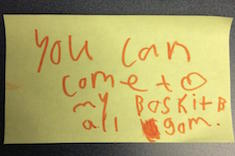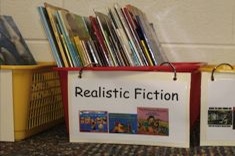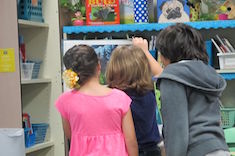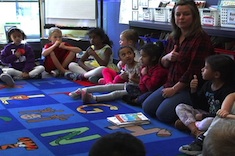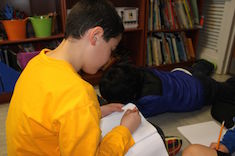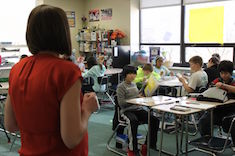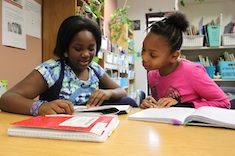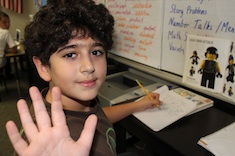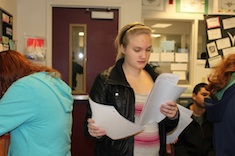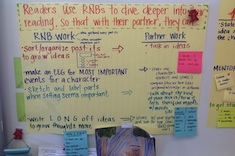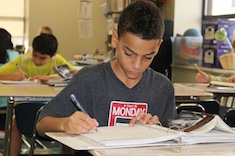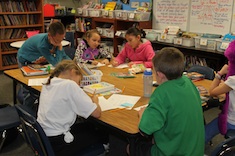Teaching Writing
Everyone who writes for Choice Literacy loves teaching writing, because we all write ourselves. We know it is "hard fun," as Donald Murray famously said—exasperating and exhilarating at the same time. The writing workshops you will read about here and see in our videos are busy, noisy, vibrant places. And most days, we wouldn't want to be anywhere else than in the midst of 'em! Here is where you'll find our latest discoveries, insights, and occasional boneheaded mistakes in teaching writing.
Latest Content
Reminder Notes
Bitsy Parks teaches her first graders to write sticky note reminders throughout the day, and is delighted by the learning and community building that ensues.
Getting the Ball Rolling in a Realistic Fiction Unit
Melanie Meehan helps elementary students move from narratives to realistic fiction by beginning with “facts” about their fictional characters.
Life in a Single Breath
Shirl McPhillips says hello to autumn and explores the power of haiku.
Free Range Learning with Nonfiction (Part 1)
Andrea Smith's students explore nonfiction through free-range roaming. She explains how she sets up expectations and resources early in the year in this first installment of a two-part series.
Conferring Questions
Ruth Ayres finds there can be a difference between questions in writing conferences that inspire an enthusiastic response, and those that foster more reflection and independence. Download a question list to use during your writing conferences.
Quick Reading Reflection in First Grade
Bitsy Parks has her first graders complete a quick reading reflection before a share session early in the school year.
Growing Writing Stamina
Tara Barnett and Kate Mills have a confession to make: in the first weeks of school, many of their fourth-grade students didn’t write much at all in workshops. It was only after tackling the issue of writing stamina head-on that they saw rapid progress.
Getting Started with Voice Recorded Responses
Gigi MicAllister gives step-by-step advice on how she set up voice-recorded response as an option in her fourth-grade classroom.
Visual Essays
Gretchen Schroeder finds visual essays are a fun option for her high school students to present what they have learned just before Christmas break.
Supporting Brave Writers
Tara Barnett and Kate Mills use the Sara Bareilles song “Brave” to help their fourth-grade students move from bed-to-bed stories to more emotive writing early in the year.
Teaching Students How to Give Revision Suggestions
Franki Sibberson shares a lesson progression to help students learn how to give helpful revision feedback. She uses online videos and resources to support her work.
Why I Don’t Like Erasers
Melanie Meehan explains why erasers can be problematic in writing workshops, beyond just eliminating the ability of teachers to see the progression of revisions in a young writer's work.
Story Maps for Reflection in the Midst of Drafting
Jennifer Allen finds the use of a story map opens up revision possibilities for a young writer stuck in a drafting rut.
Student (and Teacher) Risk-Taking
Carly Ullmer ponders what it means to take risks in her middle school classroom as she and her students experiment with different response options.
Branding Blogs (Part 3)
Andrea Smith concludes her series on the power of branded student blogs in her fourth-grade classroom.
Branding Blogs (Part 2)
Andrea Smith continues her series on the power of "branding" for improving student blogs. In this installment, students examine mentor blogs and bloggers.
Best First Drafts
Ruth Ayres confers with fourth grader Nicole and reinforces advice from her mom about capitalizing proper nouns, as well as the importance of applying what you know about conventions in first drafts.
The Craft of Blogging
Franki Sibberson uses a micro-progression of her own draft of a blog post to help her third graders improve their blogging skills.
The Importance of Audience
Julie Johnson demonstrates how teachers can help students think through issues of audience during writing workshops.
Top 10 Conferring Tips
Ruth Ayres gives her best advice for honing your conferring skills with this succinct list of tips for better conferences.
Bad Days in Workshops
Franki Sibberson realizes there are some bad days in literacy workshops that hold no great life lessons for teachers and students, and that is okay.
Teaching Revision Strategies: Introduction and Modeling
Heather Rader shares a process for teaching peer editing and revision skills that helps students learn how to assist each other kindly during writing workshop. This is the first video in a three-part series.
An Unconventional Scavenger Hunt: Finding Errors
Jennifer Schwanke finds that a scavenger hunt for errors to add to a bulletin board is a great way to build editing skills and a writing community all year long in her seventh-grade classroom.
Teaching Revision Strategies: Partner Work
Partners confer over revision in fifth grade in this second installment of a three-part video series.
The Pocahontas Ewww: Writing and Inquiry for Context
Mark Levine finds his middle school students are appalled by some of the cultural differences from times gone by, and shares how he fosters more understanding.
How to Keep Conferring Notes
Ruth Ayres shares her grid notes sheet, and takes teachers step-by-step through the process of using this assessment tool in conferences and instruction.
Charts as Tools, Charts as Teachers
Tara Barnett and Kate Mills give three principles they use to help avoid the “charts as wallpaper” syndrome in their fourth-grade classroom.
Better Mondays Through Quick-Writes
Mark Levine uses quick-writes with his middle school students to set the expectation at the start of the week for work together that is independent, thoughtful, and conversational.
Plans for Writing Circle
Stella Villalba starts writing workshop with her young English language learners by having everyone share their plans in a community circle.
Using Mentor Texts to Craft Leads
Tara Barnett and Kate Mills carefully select the first mentor text for crafting leads in their fourth-grade classroom.
Browse Content By
Type
Category
- Assessment Tools
- Big Fresh Archives
- Booklists
- Choice Numeracy
- Classroom Design
- Common Core
- Community Building
- Conferring
- Content Literacy
- Digital Literacy
- English Language Learners
- Equity
- Family Relations
- Free Samples
- Guiding Groups
- Leadership
- Literacy Coaches
- Mentor Texts
- Minilessons
- New Teacher Mentors
- Podcasts
- Poetry
- Quote Collections
- Reading Strategies
- Self Care
- Struggling and Striving Learners
- Talking and Listening
- Teacher Study Groups
- Teaching Reading
- Teaching Writing
- Word Study and Vocabulary
Author
- Melissa Quimby
- Nawal Qarooni
- Gwen Blumberg
- Julie Cox
- The Lead Learners
- Hannah Tills
- Josie Stewart
- Ruth Metcalfe
- Mallory Messenger
- Becca Burk
- Jodie Bailey
- Vivian Chen
- Mary Brower
- Tiffany Abbott Fuller
- Stephanie Affinito
- Ruth Ayres
- Leigh Anne Eck
- Heather Fisher
- Shari Frost
- Julie Johnson
- Suzy Kaback
- Gigi McAllister
- Shirl McPhillips
- Melanie Meehan
- Cathy Mere
- Debbie Miller
- Tara Barnett and Kate Mills
- Tammy Mulligan
- Dana Murphy
- Bitsy Parks
- David Pittman
- Brenda Power
- Heather Rader
- Matt Renwick
- Mandy Robek
- Christy Rush-Levine
- Gretchen Schroeder
- Jen Schwanke
- Brian Sepe
- Katherine Sokolowski
- Stella Villalba
- Jennifer Vincent
Grade Level
Choice Literacy Membership
Articles
Get full access to all Choice Literacy article content
Videos
Get full access to all Choice Literacy video content
Courses
Access Choice Literacy course curriculum and training

